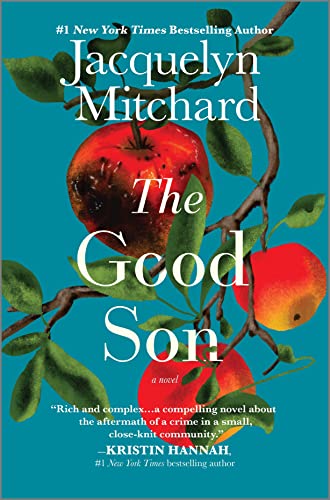Number one New York Times bestselling and award-winning author Jacquelyn Mitchard is beloved around the world for her books that get to the heart of the essential human condition. Her novels, beginning with The Deep End of the Ocean, which was the debut selection of Oprah’s Book Club, thrust ordinary people into extraordinary circumstances, and the pressures they experience reveal universal truths usually hidden below the surface.
Her upcoming novel, THE GOOD SON, which MIRA Books will publish January 18, 2022, centers on a mother who faces the unimaginable. Her beloved and typically good-natured son was convicted of killing his girlfriend in the midst of a drug-fueled episode that left him with no memory of his actions. Four years later, sober, deeply repentant and broken-hearted, Stefan is on the brink of being released and is desperate to reconnect with his family and friends and find a way back into society. But what Thea discovers is that the pain and duress her family faced during the trial and Stefan’s incarceration were only the beginning. While her love for her son is unwavering, she’s overwhelmed by guilt over having her child home alive and well, while another mother suffers from such a terrible loss. And she fears for her family’s safety as they experience the open anger and hostility of a community still reeling from the crime and now faced with the perpetrator free and living in their midst.
Jacquelyn Mitchard was inspired to write the novel after a chance encounter with a woman in a coffee line at a hotel years ago. The woman shared with her that she stayed in that hotel every weekend when she came to visit her son, who was serving 27 years in prison for killing the only girl he’d ever loved. Mitchard, the mother of young men herself, was aghast as she imagined how that mother must be feeling and what she might have endured, and so the seeds for THE GOOD SON were planted.
“When I set out to write this story,” Mitchard explained, “I wondered whether I would be able to make the characters sympathetic, even though they were sympathetic to me. But what I discovered is that the hallmark is love. Even if the one you love most does the worst possible thing, love is not erased, instead it survives. THE GOOD SON is a tribute to that mother’s love.”
Readers will be devastated, uplifted, and utterly engrossed by Jacquelyn Mitchard’s latest novel, and eager to discuss it with friends, family and within their book clubs. I urge you to make plans for review/feature cover this winter and will be in touch soon to discuss the possibilities.
What was it like to write about a situation in which none of the characters could be seen as sympathetic?
Many people have wondered just that, until they read the story. In fact, to me, they’re all sympathetic—the young murderer who, because of drug abuse, has almost no recollection of the events of the night his sweetheart died, the mother of the girl struggling to find a way to give meaning to her daughter’s violent death, and the mother of the boy—the only one left on earth who could love him and who must find a way to do that.
You have grown sons of your own. Could you do what Thea did in fighting to find a way to believe in Stefan despite what he did?
Like Thea, I would have to. It would be the hardest thing I would ever have to do, but I would have to recognize that the child I raised and loved was still there inside the young man who’d committed such a terrible act. If I could not, any hope of redemption would be erased.
Stefan’s situation on leaving prison was more dire than most. He came home to a town in which the girl who died was well-known and beloved, in which his family had been well-known and respected. But many individuals who’ve “done their time” face a wall of resistance when they try to start their lives over.
They do, and it’s one of many reasons that the idea of “rehabilitation” often fails. People can be determined to change their lives, but if no one believes them, falling back into familiar patterns and familiar company is so easy. We often say that we’re a culture who believes in second chances, but that’s very selective. In some ways, of course, it has to be. Some patterns of behavior can never change, and the community has to try to be safe from predators. But there are people who do deserve a second chance, particularly if they were young offenders.
How do you create and develop a plot in which nothing is as it seems?
I think of stories like those nesting matrushka dolls. There is always another “self” inside each one of us, and inside that self, there is always another story. What’s most interesting to me is those times when none of the facts of an event is in dispute, but the reasons why events took place transform everything we believe. Without surprises, there would be no stories, and storytellers are deeply drawn to situations in which they have to confront the “God forbids” of life. We see stories as talismans. As Jodi Picoult told me once, “I write about these things so they won’t happen.”
The Good Son isn’t just about a family, it’s about the effect of a crime on a community. Over the past several decades, true crime stories, podcasts and novels have become a hot commodity. Why are we fascinated by such awful deeds?
I think it’s because we want to believe that our nature is essentially good. When an act violates that central belief, even though we know that this happens every day in every echelon of society, it sets off a sensation of moral vertigo. Trying to understand why, is our attempt to restore equilibrium in response to that vertigo, even if it’s an illusion. We seem to need reasons why things happen so that we can sleep nights.
Dating violence is a key thread in the story of The Good Son. Although there’s a growing awareness of the abuse of young women that is not strictly domestic abuse, is it still an issue that deserves more attention?
It deserves a great deal more attention, and some of the reasons why that’s true go deep into the social fabric. Even in ordinary circumstances, there can be the notion that love presumes a kind of ownership—and while of course this goes both ways in couples, often it’s most clearly expressed by the man’s orientation toward “his” woman. Girls seem to start early on noticing what boyfriends expect and self-limiting their own initiative in relation to the boy’s desires for the way things should be. Sometimes, that will expresses itself through control—where she goes, who she’s with, what she does, all in the name of caring. Those preferences sometimes don’t even need to be spoken. An acquaintance of mine is an influential psychologist and author, and she pointed out to me a few years ago that she would no longer be going away to work on books because it upset her husband. “He likes me to be around,” she said. “So, that’s a good thing, right?” Well, of course, we should want the people we love to be around, but even this woman, an expert on marriage and relationships, didn’t want to see her mate’s control over her. And it’s not such a big stretch to see the roots of some of the concerns of the #MeToo movement in the willingness of women to excuse the dicey behavior of men as a matter of course—and much more often than the other way around.
So is an extension of that concern the need to raise sons to be good feminists?
It’s so important that young men grow up not only seeing women as equals but understanding that women are still in a “catch up” position from hundreds of years of tradition. There’s so much noise surrounding some men’s fears about what true equality will mean for them, and for masculinity itself. It infects even the ways some well intentioned young men think. I see all these crazy websites (and I use the term “crazy” advisedly) in which men are pontificating about how much they worry that all this pressure for equal pay and so forth is making woman unhappy and dissatisfied. And of course, this is again one of those things that only has to be reversed to expose its absurdity…it’s not really the happiness of women that these guys are worried about.
ABOUT THE AUTHOR:
 Jacquelyn Mitchard was born in Chicago. Her first novel, The Deep End of the Ocean, was published in 1996, becoming the first selection of the Oprah Winfrey Book Club and a #1 New York Times bestseller. Nine other novels, four children’s books and six young adult novels followed, including Two if By Sea, No Time to Wave Goodbye, Still Summer, All We Know of Heaven, and The Breakdown Lane. Mitchard’s writing has won or been nominated for the Shirley Jackson Award, the Orange Broadband Prize for Fiction, UK’s Talkabout Prize, and the Bram Stoker Award. A former daily newspaper reporter, Mitchard is a professor in the Master of Fine Arts program at Miami University of Ohio. She frequently writes for such publications as Glamour, O the Oprah Winfrey Magazine, Marie Claire, and Reader’s Digest. Her essays and short stories have been widely anthologized. She lives on Cape Cod with her family.
Jacquelyn Mitchard was born in Chicago. Her first novel, The Deep End of the Ocean, was published in 1996, becoming the first selection of the Oprah Winfrey Book Club and a #1 New York Times bestseller. Nine other novels, four children’s books and six young adult novels followed, including Two if By Sea, No Time to Wave Goodbye, Still Summer, All We Know of Heaven, and The Breakdown Lane. Mitchard’s writing has won or been nominated for the Shirley Jackson Award, the Orange Broadband Prize for Fiction, UK’s Talkabout Prize, and the Bram Stoker Award. A former daily newspaper reporter, Mitchard is a professor in the Master of Fine Arts program at Miami University of Ohio. She frequently writes for such publications as Glamour, O the Oprah Winfrey Magazine, Marie Claire, and Reader’s Digest. Her essays and short stories have been widely anthologized. She lives on Cape Cod with her family.
Visit her website: https://jacquelynmitchard.com/
Twitter: @jackiemitchard
Facebook: @jacquelyn.mitchard
Instagram: @jacquelynmitchard






